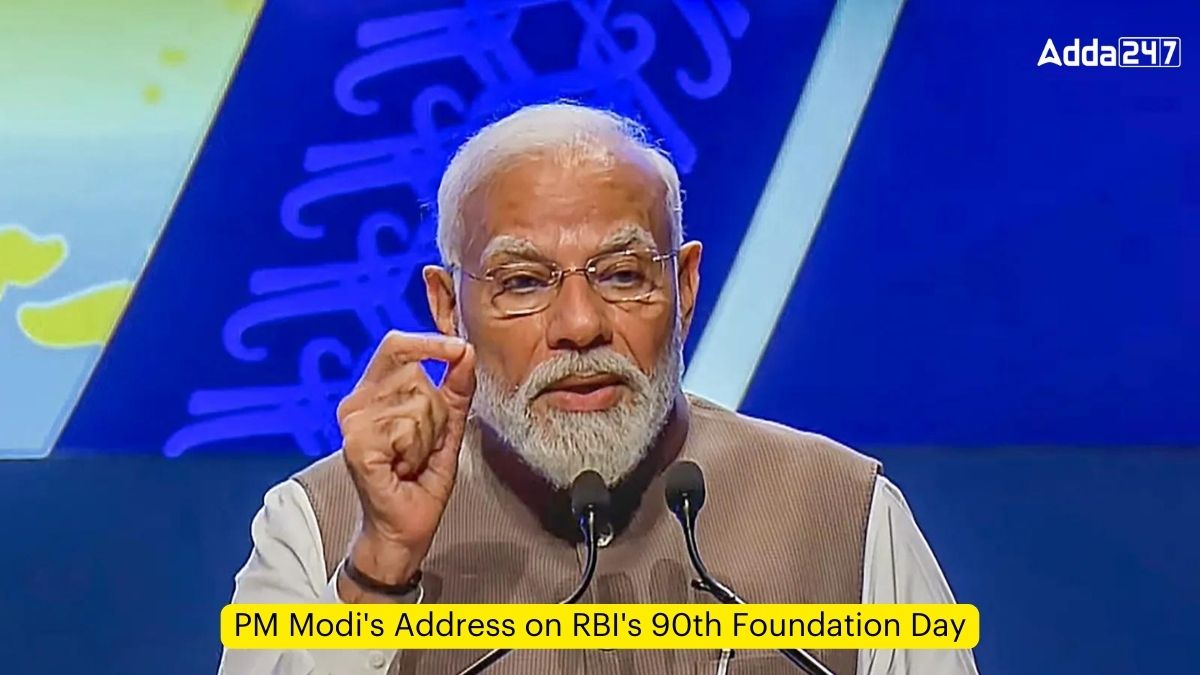RBI’s Journey and Achievements
My dear sisters and brothers, the Reserve Bank of India has reached a historic milestone today, completing 90 years of its existence. The RBI has been a witness to both the pre and post-independence eras of our nation. Over these nine decades, it has created a global identity for itself through its professionalism and commitment. I congratulate all the staff of the RBI on this momentous occasion.
You, the present staff of the RBI, are fortunate, as the policies drafted today will shape the next decade of this institution. The next 10 years will lead the RBI to its centenary year. This next decade is extremely important for the resolutions of a Viksit Bharat (Developed India). The RBI’s priority should be towards fast-paced growth, with a focus on trust and stability. I convey my best wishes for the fulfillment of the RBI’s goals and resolutions.
Banking Sector Transformation
The importance of coordination between monetary and fiscal policies in the GDP and the economy of the country cannot be overstated. I recall the 80-year celebration of the RBI in 2014 and the challenges and problems like NPAs (Non-Performing Assets) and stability faced by the banking system at that time. However, today, we have reached a point where the Indian banking system is being seen as a strong and sustainable system worldwide. The once struggling banking system is now profitable and showing record credit growth.
This transformation was made possible by the clarity of policy, intentions, and decisions. As they say, “Where intentions are right, results too are correct.” We worked on the strategy of recognition, resolution, and recapitalization. A capital infusion of 3.5 lakh crore was undertaken to help public sector banks, along with many governance-related reforms. The Insolvency and Bankruptcy Code alone has resolved loans amounting to 3.25 lakh crores. More than 27,000 applications involving underlying defaults of more than 9 lakh crores were resolved even before admission under IBC. The Gross NPAs of banks, which stood at 11.25 percent in 2018, came down to below 3 percent by September 2023. The problem of twin balance sheets is now a thing of the past. I compliment the RBI for their contribution to this transformation.
Financial Inclusion and Digital Push
Even though discussions related to the RBI often involve complex financial terminologies, the work carried out by the RBI directly impacts the lives of common citizens. In the last 10 years, we have highlighted the connect between central banks, banking systems, and beneficiaries at the grassroots level. A prime example of this is the financial inclusion of the poor. 55 percent of the 52 crore Jan Dhan accounts in the country belong to women.
Financial inclusion has also impacted the agriculture and fisheries sectors, where more than 7 crore farmers, fishermen, and cattle owners have access to PM Kisan Credit Cards, providing a significant push to the rural economy. The regulations of the Reserve Bank of India regarding cooperative banks have boosted the cooperative sector in the past decade.
More than 1200 crore monthly transactions via UPI (Unified Payments Interface) have made it a globally recognized platform. The transformations of the past 10 years have enabled the creation of a new banking system, economy, and currency experience, including the work being done on Central Bank Digital Currency.
Vision for the Next Decade
As we look ahead, the importance of clarity for the targets of the next 10 years cannot be overstated. We must keep an eye on the changes brought about by the cashless economy while promoting digital transactions. Deepening financial inclusion and empowerment processes is also crucial.
Stressing the diverse banking needs of a large country like India, we need to improve the ‘ease of doing banking’ and provide tailor-made services as per the needs of the citizens. Artificial Intelligence and Machine Learning will play a vital role in this.
RBI’s Role in Growth and Stability
The RBI has a crucial role in the speedy and sustainable growth of the country. It has achieved infusing rule-based discipline and fiscally prudent policies in the banking sector. Now, the RBI should advance estimate the needs of various sectors to take proactive steps, while rest assured of the government’s support.
Steps like giving the right of inflation targeting to the RBI and the performance of the Monetary Policy Committee have kept inflation at a moderate level, even during difficult times like the Covid-19 pandemic. Active price monitoring and fiscal consolidation also contributed to this.
“Nobody can stop a country from progressing if its priorities are clear,” I emphasized. We gave heed to financial prudence and prioritized the lives of common citizens during the Covid-19 pandemic, which led to the poor and middle class emerging out of the adversity and giving momentum to the country’s growth today. The Indian economy is creating new records at a time when many countries are still trying to recover from the economic shock of the pandemic. The RBI has a role in taking India’s successes to the global level.
For any developing country, creating a balance between inflation control and growth is important. I am confident that the RBI can become a model for this and play a leadership role in the world, thereby supporting the entire global south region.
Supporting Youth and New Sectors
India is the most youthful nation in the world today, and the RBI has a critical role in fulfilling the aspirations of the youth. Our policies have opened up new sectors in the country, thereby creating numerous opportunities for the youth. For example, the expansion of the green energy sectors like solar energy, green hydrogen, and ethanol blending. We have also seen the rise of indigenously made 5G technology and increasing exports in the defence sector.
MSMEs (Micro, Small and Medium Enterprises) have become the backbone of India’s manufacturing sector. The implementation of the Credit Guarantee Scheme during the Covid-19 pandemic supported these MSMEs. I urge the RBI to come up with out-of-the-box policies to ensure credit availability for the youth associated with the new sectors.
Innovation and Future Readiness
Innovation is crucial in the 21st century, and we must be prepared for the proposals that will come with regard to cutting-edge technologies, with teams and identification of personnel for the task. Bankers and regulators should be ready for the needs of new and traditional sectors like space and tourism. Experts believe that in the coming years, Ayodhya is going to become the biggest religious tourism center in the world.
The work done by the government for financial inclusion and digital payments has created transparency in the financial capacity of small businesses and street vendors. “This information must be used to financially empower them,” I stressed.
Global Role and Economic Self-Reliance
In the next 10 years, we must increase the economic self-reliance of India so that the impact of global issues is mitigated. Today, India is becoming the engine of global growth, with a 15 percent share in global GDP growth. We are making efforts to make the Rupee more accessible and acceptable throughout the world.
However, the rising trends of excessive economic expansion and increasing debt, with the private sector debt of many countries having doubled their GDP, are creating a negative impact on the world. I suggest the RBI conduct a study on this, keeping in mind the prospects and potential of India’s growth.
Banking Sector Transformation
A strong Banking industry is crucial for providing required funding to the projects of the nation. Technologies like AI (Artificial Intelligence) and Blockchain are bringing changes, and cyber security is important in the growing digital banking system. We must think about the required changes in the structure of the banking system in light of fin-tech innovation, as new financing, operating, and business models will be needed.
Meeting the credit needs of global champions to street vendors, of the cutting-edge sectors to traditional ones, is critical for a Developed India. The RBI is the appropriate body for the holistic appreciation of the banking vision for a Developed India.






 India’s Green Steel Revolution: What Is ...
India’s Green Steel Revolution: What Is ...
 PM Modi’s ‘Ek Ped Maa Ke Naam’ Gift to K...
PM Modi’s ‘Ek Ped Maa Ke Naam’ Gift to K...
 India & Maldives Celebrate 60 Years ...
India & Maldives Celebrate 60 Years ...

